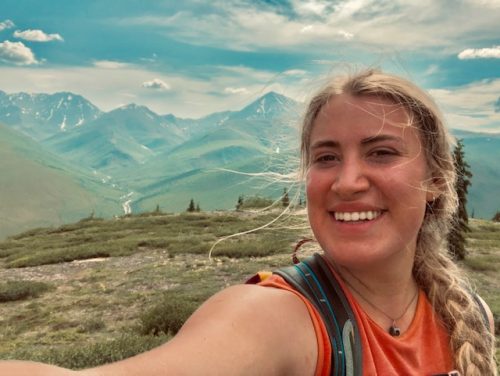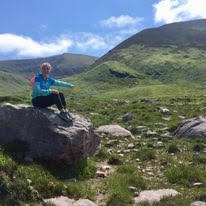Recent alumna inspires Climate Scholars Program
May 27, 2021

By Elizabeth Talbot
Abigail Steffen ’20 wants to change the world. And she’s planning to do it while there is still time to address a looming climate crisis. The recent UAF graduate is interested in changing human behavior by addressing obstacles in society and institutions.
Growing up in Chicago, Steffen spent her summers visiting family in Fairbanks. When she expressed an interest in spending her senior year of high school abroad, or at least somewhere other than her hometown, a cousin in Alaska suggested Fairbanks. That was a tipping point in planning for her own future.
“I became interested in climate change and protecting the environment,” Steffen said. “Being on the forefront of climate change while living in one of the last places with millions of miles of undeveloped land seemed natural.”
Steffen knew she wanted to major in environmental studies. It just so happened that the university in her new hometown stood out as one of the best in the field. She knew that the faculty and research underway at UAF will have an impact on any adjustments the world is able to make to address the climate crisis.
UAF also offered her the opportunity to study French, the “secret language” she shared with her mom. While there were benefits to finishing high school in Fairbanks, she still wanted to live outside the country. As a UAF student, she spent a semester in Rennes, France, a semester in Stirling, Scotland, and a summer in Quebec, Canada.
“I was studying political science and French, and I was able to experience new thought processes and approaches to political issues,” she said. “In Scotland, I was taking classes related to the environment and environmental policy. Most of those credits went to my interdisciplinary minor in global climate adaptation and policy.”

She went on to earn a B.S. in natural resource management and a B.A. in foreign languages, with a minor in global climate adaptation and policy. In her junior year, she also participated in the newly formed Climate Scholars Program, becoming one of its first graduates.
In fact, she helped inspire its creation.
“We noticed that there was no place on campus for students like Abigail to have community work tied into their education,” said Honors College Director Alexander Hirsch. “That needed to be recognized and sustained in an institutional way.”
The Climate Scholars Program offers students summer intensives and an internship at the Tidelines Institute in Southeast Alaska, where they research a question that focuses on climate change, communication and advocacy.
“We created the program to create more Abigails in the future,” Hirsch said. “And to give students opportunities to do some of the cool things that she's done and others like her.”
Steffen did not wait to graduate to start honing the skills her education provided. She worked with the Center for Arctic Policy Studies at UAF in the summer of 2020. She researched how Alaska’s government relates to climate policy. She also looked at the tenacity of Alaskans who are taking responsibility for climate action in the state.
Steffen said the way industry and humans operate is interlaced with the increased impact on the climate. She is intrigued with how law and policy affect accountability, especially for large corporations.
“It was inspiring to learn more about the processes and realities of climate policy in Alaska,” she said. “I left the project with a better understanding of the weaknesses and strengths of the process and feel better equipped to apply myself to help Alaska move forward with climate policy. My choice to study environmental sciences reflects my love and respect for Alaska’s ecosystems and my hope to help sustain them.”
These accomplishments did not come without sacrifice or difficulties. She gave up her hopes of playing college basketball in favor of her studies. She also faced the challenge of finding balance in such a busy schedule. Midway through her undergraduate degree, she began experiencing anxiety surrounding her schoolwork and relationships.
“I was taking 18 or more credits and trying to stay active in my communities,” she said. “It took a toll. I still experience anxiety but now I take it as a sign that I need to slow down or take some mental health time. I am still working on finding a good balance. I am able to set boundaries and then recognize when my workload or schedule went beyond what was productive or enjoyable. I try to listen to my body and my emotional reactions.”
She credits the opportunities she found at UAF for her success. One mentor in particular made a big impression — her French professor and advisor, Yelena Matusevich.
“Without her help and guidance, I would have missed out on incredible experiences,” Steffen said. “She also continuously offers guidance and generously offers her expansive network to help her students move forward in their careers. She does this for every single student she has.”
Before Steffen continues her work on climate change, she is going to take another trip abroad.
“I’m excited to report that I just accepted a teaching position in France starting this fall,” she said. “I am really excited as I see it as an opportunity to work on my French skills and hopefully make some international connections.”
But first, she will intern this summer with the Sitka Conservation Society, working on climate policy. Steffen wants to work to address climate change on the global level and travel the world, but plans to ultimately return to Alaska.
“I’ve made incredibly meaningful connections in Alaska, and I consider it my home now,” she said. “The state is in an even more urgent position regarding climate change, so I feel an instinctive motivation to protect it as best I can. Alaska motivated me then, and, now that I live here, I want to invest in the future of this land.”


